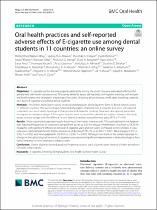| dc.description.abstract | Objectives
E-cigarette use has become popular, particularly among the youth. Its use is associated with harmful general and oral health consequences. This survey aimed to assess self-reported oral hygiene practices, oral and general health events, and changes in physiological functions (including physical status, smell, taste, breathing, appetite, etc.) due to E-cigarette use among dental students.
Methods
This online, multicounty survey involved undergraduate dental students from 20 dental schools across 11 different countries. The questionnaire included demographic characteristics, E-cigarette practices, self-reported complaints, and associated physiological changes due to E-cigarette smoking. Data were descriptively presented as frequencies and percentages. A Chi-square test was used to assess the potential associations between the study group and sub-groups with the different factors. Statistical analysis was performed using SPSS at P < 0.05.
Results
Most respondents reported regular brushing of their teeth, whereas only 70% used additional oral hygiene aids. Reported frequencies of complaints ranged from as low as 3.3% for tongue inflammation to as high as 53.3% for headache, with significant differences between E-cigarette users and non-users. Compared to non-smokers, E-cigarette users reported significantly higher prevalence of dry mouth (33.1% vs. 23.4%; P < 0.001), black tongue (5.9% vs. 2.8%; P = 0.002), and heart palpitation (26.3%% vs. 22.8%; P = 0.001). Although two-thirds of the sample reported no change in their physiological functions, E-cigarette users reported significant improvement in their physiological functions compared to never smokers or tobacco users.
Conclusion
Dental students showed good oral hygiene practices, but E-cigarette users showed a higher prevalence of health complications. | en_US |

